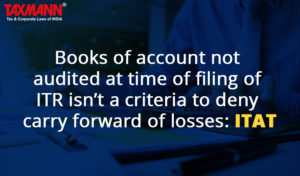Books of account not audited at time of filing of ITR isn’t a criteria to deny carry forward of losses: ITAT
- Blog|News|Income Tax|
- 2 Min Read
- By Taxmann
- |
- Last Updated on 5 May, 2022

Case Details: DCIT v. Brahmos Aerospace (Thiruvananthapuram) Ltd. - [2022] 137 taxmann.com 340 (Cochin - Trib.)
Judiciary and Counsel Details
-
- George Mathan, Judicial Member and Ramit Kochar, Accountant Member
- Smt. Jamunna Devi, Sr. DR for the Appellant.
- Abraham Joseph Markos, Adv. for the Respondent.
Facts of the Case
The assessee was engaged in the business of Manufacturing Engineering goods. It filed its return of income declaring loss. The return was duly filed within the prescribed time under section 139(1).
However, the financial statements were not audited by the time of filing of return of income. The assessee’s accounts were audited later after 3 months and filed with Assessing Officer (AO). The assessee did not file a revised return of income after getting its accounts audited with a revised figure of income (loss) post-audit.
AO completed the assessment by not allowing carried forward of business loss as no revised return was filed by the assessee. On appeal, the CIT(A) allowed relief to the assessee. Aggrieved-AO filed the instant appeal before the Tribunal.
ITAT Held
The Tribunal held that if the assessee has not got its statutory audit done under the Companies Act within the prescribed time, or has not got its tax audit done under Income-tax Act, there are penal provisions provided under the statute for such non-compliance.
There could be several reasons for not getting the statutory audit/tax-audit done within the prescribed time, but unless there is a specific/express provision that stipulates that if the audit is not done within the prescribed time, the loss shall not be allowed to be carried forward, the scope of the statute cannot be expanded.
Section 80 of the Income-tax Act stipulates that the return of income is to be filed within the prescribed time, which the assessee did comply in the given case. Thus, there was no justification for denying the carry forward of the business loss based on the fact that accounts were not audited by the time of filing of return of income under section 139(1).
List of Cases Referred to
-
- Asstt. CIT v. Kerala Hi-Tech Industries Ltd. [IT Appeal No. 601 (Coch) of 2010, dated 29-3-2012] (para 1)
- CIT v. Pruthvi Brokers & Shareholders [2012] 23 taxmann.com 23/208 Taxman 498/349 ITR 336 (Bom.) (para 6).
Disclaimer: The content/information published on the website is only for general information of the user and shall not be construed as legal advice. While the Taxmann has exercised reasonable efforts to ensure the veracity of information/content published, Taxmann shall be under no liability in any manner whatsoever for incorrect information, if any.

Taxmann Publications has a dedicated in-house Research & Editorial Team. This team consists of a team of Chartered Accountants, Company Secretaries, and Lawyers. This team works under the guidance and supervision of editor-in-chief Mr Rakesh Bhargava.
The Research and Editorial Team is responsible for developing reliable and accurate content for the readers. The team follows the six-sigma approach to achieve the benchmark of zero error in its publications and research platforms. The team ensures that the following publication guidelines are thoroughly followed while developing the content:
- The statutory material is obtained only from the authorized and reliable sources
- All the latest developments in the judicial and legislative fields are covered
- Prepare the analytical write-ups on current, controversial, and important issues to help the readers to understand the concept and its implications
- Every content published by Taxmann is complete, accurate and lucid
- All evidence-based statements are supported with proper reference to Section, Circular No., Notification No. or citations
- The golden rules of grammar, style and consistency are thoroughly followed
- Font and size that’s easy to read and remain consistent across all imprint and digital publications are applied



 CA | CS | CMA
CA | CS | CMA
